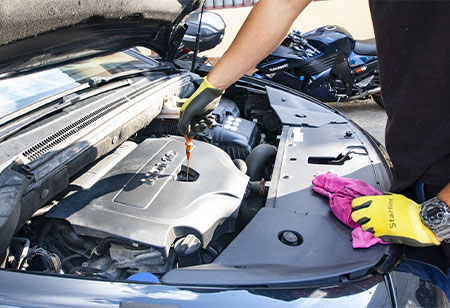
Distracted driving, speeding, and reckless behavior are all well-known contri- butors to car accidents. However, there's another factor that plays a signi- ficant role in crashes and is often overlooked: poor vehicle maintenance. Yes, poor maintenance is one of the most common causes of car accidents. In fact, studies estimate that around 20% of all accidents can be attributed in some way to a lack of proper car care. This translates to a substantial number of preventable crashes every year, highlighting the importance of keeping your vehicle in top shape.
So, how exactly does skipping a routine oil change or ignoring worn-out tires translate into a collision? Read on
The Silent Threat: How Neglected Parts Turn into Road Hazards
Many critical components within a car work together to ensure a safe driving experience. When these parts are neglected, they deteriorate and can malfunction at the most inopportune moments, leading to accidents. Here are some of the most common ways poor maintenance translates into road hazards:
1) Brake Failure: Brakes are arguably the most crucial safety feature in a car. They allow drivers to slow down and stop safely, preventing collisions. Worn-out brake pads, leaking brake fluid, or faulty brake lines can significantly reduce stopping power, making it difficult to avoid an accident, especially during emergencies.
2) Tire Trouble: Tires are the only point of contact your car has with the road. Proper inflation, tread depth, and overall condition are vital for maintaining control. Underinflated tires can lead to blowouts, while worn-out treads compromise traction, especially in wet or icy conditions. This can cause hydroplaning (loss of traction when driving through water) or skidding, making it difficult to steer and brake effectively.
3) Steering System Issues: A faulty steering system can make even the simplest maneuvers a challenge. Worn-out tie rods, loose ball joints, or power steering malfunctions can lead to a loss of steering control, making it nearly impossible to navigate safely.
4) Lighting Problems: Headlights, taillights, and turn signals are essential for visibility, especially during nighttime or bad weather. Malfunctioning lights can make it difficult for other drivers to see your car, increasing the risk of rear-end collisions or accidents at intersections.
5) Neglected Fluid Levels: Various fluids, such as engine oil, coolant, and transmission fluid, play vital roles in keeping your car running smoothly. Low fluid levels can lead to overheating, engine failure, and even complete breakdowns, potentially causing accidents if they occur at inopportune moments, like on busy highways.
 Beyond Basic Maintenance: The Importance of Regular Inspections
Beyond Basic Maintenance: The Importance of Regular Inspections
While routine maintenance like oil changes and tire rotations are crucial, a comprehensive inspection by a qualified mechanic is equally important. Mechanics can identify potential problems before they become critical failures, preventing accidents and saving you money on repairs down the line. Regular inspections should include checking brakes, tires, steering components, fluid levels, belts, hoses, and lights.
Taking Responsibility: Proactive Maintenance for Safer Roads
The responsibility for preventing maintenance-related accidents lies with the driver. Here are some steps you can take to be proactive about your car's health:
1) Consult your owner's manual: The manual outlines the recommended maintenance schedule for your specific car model. It details how often to change oil, rotate tires, and replace various parts.
2) Schedule regular inspections: Don't wait for problems to arise before taking your car to a mechanic. Aim for an inspection at least once a year, or more frequently if you drive a lot.
3) Be alert to warning signs: Pay attention to any unusual noises, vibrations, or warning lights on your dashboard. These can be early indicators of potential problems.
4) Keep a maintenance log: Documenting your car's service history helps you stay on track with recommended maintenance and identify any recurring issues.
By prioritizing vehicle maintenance, you're not just protecting your car's longevity, you're also contributing to safer roads for yourself and others. Remember, a well-maintained car is a predictable car, and predictability is key in avoiding accidents. So, make car care a regular part of your routine, and enjoy the peace of mind that comes with knowing your vehicle is ready to handle anything the road throws your way.
We use cookies to ensure you get the best experience on our website. Read more...